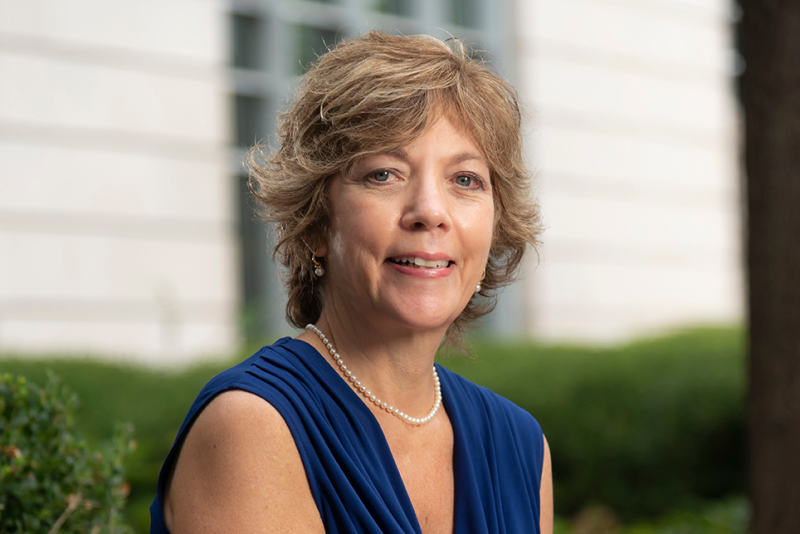
Navigating an Evolving Profession
In a lot of ways, Susan Blackwell (Crawford), MHS, PA-C’89, and the physician assistant profession have grown up together. They were born at roughly the same time, matured in parallel and proximity, and for more than three decades they’ve been inextricably linked.
Blackwell grew up on her family’s farm in Caswell County north of Durham. The PA profession was born just to the south, at Duke, founded in 1965 by cardiologist Eugene A. Stead, Jr., MD, former chair of the Department of Medicine in the Duke University School of Medicine.
At the time, nurses and primary care physicians were in short supply, and Stead established a program to create a new position “to fill a gap between physician and nurse.” People in this new field, he said, would be trained in numerous areas of the medical profession. “We have chosen to call these individuals ‘physician-assistant’,” Stead wrote.
The program he created at Duke remains the best in the nation, perennially ranked No. 1 by U.S. News & World Report. Blackwell entered the program in 1987, graduated two years later, and has been a practicing PA at Duke ever since. This year — her 32nd on the job — the program honored her as the 2021 Distinguished PA Alumnus of the Year.
When she graduated in 1989, the Duke PA Program and the profession itself were gaining momentum. PAs were practicing in all specialties, and the profession — initially intended for men — had rapidly caught on with women.
But the field was still a long way from what it is today.
“I can tell you a lot of stories about the way that PA practice has changed in the last 35 years,” reflects Blackwell. “My profession has had to work pretty hard toward being recognized.”
In the beginning, she notes, there was “a learning curve” as physicians, nurses, nurse practitioners, and physician assistants had to adjust their roles and expectations within the team. Patients also had to adapt. Blackwell remembers patients asking her when she was going to finish medical school and become a doctor. Now, most patients have grown accustomed to appointments with PAs and are familiar with the team approach.
“As a PA, I can bill, I can write orders, I can write prescriptions. I can do pretty much whatever is in the scope of my supervising physician as long as I work with him,” says Blackwell. “The idea is that we (as PAs) have an independent practice. It allows the faculty, the MDs, to see more new patients, do more in their research, and write clinical trials. As PAs, we provide a lot of extra boots on the ground.”
When Blackwell graduated, many of the open positions for PAs were in primary care, but Blackwell set her sights on oncology. There weren’t any PA openings at Duke in the Division of Oncology at the time, however, so Blackwell accepted an available position in the Division of Gastroenterology.
About six months in, Blackwell heard “through the grapevine” that then-Chair of the Department of Medicine Joseph Greenfield, MD, HS’57-’59, was bringing thoracic medical oncologist Jeffrey Crawford, MD, HS’77-’78, HS’82, from the Durham Veterans Administration Medical Center, to Duke to start a thoracic oncology program.
Crawford needed a PA, and Blackwell joined him and colleagues including Walter Wolfe, MD, HS’64-’72, and Robin Vollmer, AB’63, MD’67, HS’72-’73, in establishing the Thoracic Oncology Program at Duke. She’s been practicing in the Duke Cancer Institute’s (DCI) Thoracic Oncology Clinic ever since, treating with skill and compassion hundreds of patients with lung cancer while also helping advance the PA profession, particularly in oncology. She is the team lead for the medical oncology physician assistants and nurse practitioners in four of 11 DCI Disease Groups — Sarcoma, Thoracic, Head & Neck, and Melanoma — and she has co-authored papers in high-impact journals like Cancer Control and the Journal of Thoracic Oncology.
Now a veteran of the PA profession, she mentors Duke PA Program students who’ve chosen oncology as one of their electives. Blackwell says she has an “open door for anybody who has a question” about the work of a physician assistant, from new recruits to transplants.
And three decades in, she still loves the thing that drew her to become a PA in the first place.
“It’s all about patient care,” she says. “I love being in the room with patients and their families. Those bonds, those relationships you make — not just as patients, but as people — are so important. I still love that.”
Story originally published in DukeMed Alumni News, Winter 2021